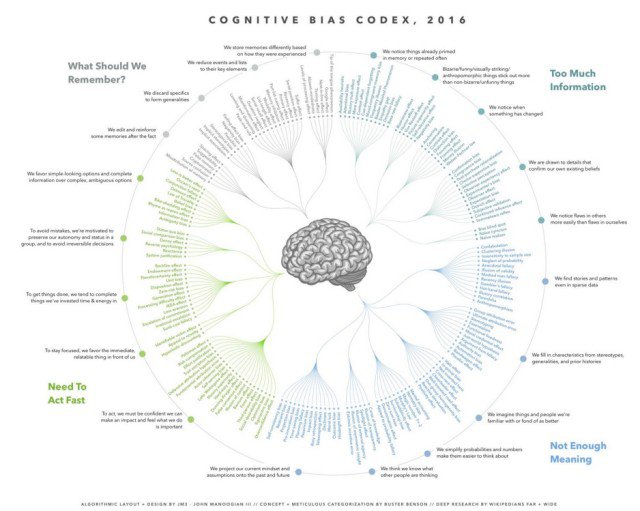Psychology: One topic, three angles (Top3ics, Feb 2)

Yet another variation on the Top3ics format: exploring three facets of one topic, highlighting one outstanding resource (plus a few extra links) for each.
You can have the very best of these links delivered on Messenger by subscribing to my CuratorBot (get a preview by asking it for ‘High3lights’).
Today’s theme, as foreshadowed in my edition on Fake News, is psychology, so for the Psychology of Fake News check out the four stories in that edition.
But there are 91 other resources tagged psychology on my Hub…
Psychology: Buster’s Best Bluffer’s Guide
However, only two of them are also tagged guide… and they’re both by the same guy.
Buster Benson’s Cognitive bias cheat sheet of last September is a 12-minute read. From my notes (my emphases):
start by remembering four giant problems our brains have evolved to deal with…:
- Information overload sucks, so we aggressively filter. Noise becomes signal.
- Lack of meaning is confusing, so we fill in the gaps. Signal becomes a story.
- Need to act fast lest we lose our chance, so we jump to conclusions. Stories become decisions.
- This isn’t getting easier, so we try to remember the important bits. Decisions inform our mental models of the world.
The full post provides an excellent overview to the inbuilt biases we’ve inherited to help survive… and which can be exploited. The good news is that it’s just been boiled down into this wonderful graphic, and a book is on the way - enjoy: Cognitive bias cheat sheet, simplified
Psychology and Trump
There are four resources tagged #Psychology and #Trump.
I’d start with:
a post for my Facebook friends about my personal experience with narcissistic personality disorder and how I view the president elect… who almost certainly suffers from it or a similar disorder.
- Coping with Chaos in the White House
See also:
- most recent: Why each side of the partisan divide thinks the other is living in an alternate reality
- most frightening: Science finds power magnifies personality. It could magnify Trump’s
- a blogplug tagged narcissism: Where is social media taking you in 2016?
- all 46 resources tagged #Trump
Psychology and Productivity (and Design)
Here I need to combine #psychology with #design and #productivity.
After all, first it helps to understand the problem:
product designers … play your psychological vulnerabilities … against you in the race to grab your attention… By shaping the menus we pick from, technology hijacks the way we perceive our choices… The need to belong, to be approved or appreciated by our peers is among the highest human motivations. But now our social approval is in the hands of tech companies.
- How Technology Hijacks People’s Minds — from a Magician and Google’s Design Ethicist
… before you can appreciate the solution:
the deeper I went into my own work, the more I realized how my always-on, always-connected state had rendered me largely useless…The attention economy… has kicked off what Harris calls a “race to the bottom of the brain stem”
- How I Got My Attention Back
See also:
- 2 from Brainpickings: The Psychology of Writing and the Cognitive Science of the Perfect Daily Routine, and The Psychology of Time and the Paradox of How Impulsivity and Self-Control Mediate Our Capacity for Presence
- Top3ics: Nurture your mind (Nov 18)
- 95 resources tagged #design, 72 tagged #productivity
I hope you found that what I found was interesting. If so, let your friends know.
Related reading
More Stuff I Think
More Stuff tagged psychology , newsletter , productivity , cognitive , design , trump
See also: Content Strategy , Social Media Strategy , Online Architecture , Personal Productivity , Communications Tactics , Psychology , Politics